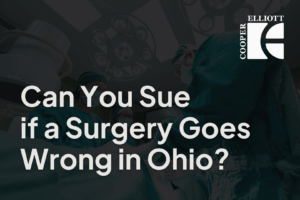In this modern age of specialization, we rely now more than ever on experts to help us with complicated tasks. But what happens when there’s a breakdown in that trust? One of our clients found out the hard way.
A promising business is imperiled
Like a lot of inventors, Liam Moore* was extremely proud of his invention. While the terms of an eventual settlement prevent us from revealing the exact nature of his technology, Liam’s invention would change people’s lives—and provide him, his company, and his employees with considerable income.
Liam started small, gradually growing a company around his invention. He relied heavily on his lawyers and other experts who knew the ins and outs of the industry, especially in the matter of patents, a crucial element for a company like his.
For all his carefulness, however, he never anticipated the possibility that the experts he trusted so much would threaten his life’s work.
When you get a patent, as Liam had for his invention, you’re required to file certain paperwork and pay a maintenance fee in order to show the government that you’re using your invention. Otherwise, the government will open up the idea to the rest of the world.
For some reason, Liam’s patent lawyers, ostensibly experts looking after Liam’s own interests, missed one of his maintenance fee filing deadlines. By the time this was discovered, one of his most important patents had lapsed, and competitors were allowed to use and profit from his idea.
Liam’s invention was no longer his anymore, and competitors had taken advantage of their opportunity. Liam’s livelihood, and those of his employees, hung in the balance.
For a free legal consultation, call (614) 481-6000
Layers and layers of a complex case
When Liam asked us to represent him, we knew we had our work cut out for us. This kind of case has many layers of complexity, because not only are we trying to prove relatively simple things—like how a law firm missed a filing deadline and failed to alert its client—but we’re also trying to prove there was patent infringement that resulted in damages (and what those damages actually were). We call that proving the “case within the case,” and it can become highly technical.
To further complicate things, deep emotions ran through this case. First, Liam felt a tremendous sense of betrayal from his original attorneys. Not only did those attorneys commit malpractice, but then as a defensive tactic, they actually started attacking Liam and the validity and quality of his patent.
Second, and most tellingly, this was a “bet-the-company case.” Losing the case could destroy the entire company, costing the jobs of everybody employed there.
We dove right in.
Our Ohio malpractice attorneys go to work
Believe it or not, the defendant law firm’s first argument was “no harm, no foul.” They assailed the patent itself, claiming that if it had ever been challenged, it would never have stood up. Then they pointed the finger at Liam: “We thought you really weren’t interested in this patent. Maybe you should have been a little more attentive to it. Maybe you should have told us more. How do we know that you really patented anything special?”
To fight on Liam’s behalf, we took a number of actions. Although the malpractice portion of the case was fairly straightforward, the “case within the case” more than made up for it in complexity.
One of the approaches we used for determining damages was to look at the products Liam’s competitors brought to market after his patent had lapsed. We had economists and experts identify those products’ market reach and analyze what royalties Liam would have received if somebody had been caught infringing on his product or patent.
We also had to become, in a sense, experts in Liam’s technology ourselves. To understand the case—the infringement, the damages, and everything in between—we had to work closely with industry experts to learn and understand the technology behind Liam’s product. Steeping ourselves in the engineering aspects of his invention allowed us to effectively and knowledgeably cross-examine our opponent’s experts and other witnesses.
While it doesn’t always pertain directly to the courtroom and the lawsuit itself, business cases (which may seem like dry affairs) still require caring and counseling. Our opponents had ruined the business Liam had spent years of hard work and sacrifice to build, and then attacked his invention and conduct. In such emotionally charged situations, providing stability, advice, and an outlet for our clients to express themselves—even if just to vent—can be invaluable to help them process what they’re going through.
Click to contact our personal injury lawyers today
Livelihoods preserved, justice served
In the end, all of the preparations and hard work paid off: The law firm settled fairly.
Needless to say, Liam was very happy and relieved. Not only would he and his employees have a chance to stay in business, but the spurious allegations about his invention and his handling of the patent were effectively disproved.
As it happens, this outcome turned out to be crucial. With the settlement, Liam was able to pivot his business and focus it on some of the other patentable ideas and products he had been developing. It enabled the company to stay in business, keep its employees, and maintain its operations.
For our part, we were gratified to see Liam not only get the justice he sought, but also be able to keep running the company in which he’d invested so much time, money, and passion. It was gratifying for us in another sense, too. For us as professionals, the kind of rigorous intellectual exercise that comes with preparing for a complex case, requiring a deep knowledge of a new industry, was as rewarding as it was challenging.
There’s a natural curiosity our lawyers have, about how the world works, and how people interact, and how the law should govern and support us. Add to that a passion for justice and helping people through their toughest times, and you can see why a difficult case like Liam’s didn’t scare us away—it just made us work harder.
*Names in this article have been changed to protect our client’s privacy.
The outcome of any client’s case will depend on the particular legal and factual circumstances of the case.
Call or text (614) 481-6000 or complete a Free Case Evaluation form

















































